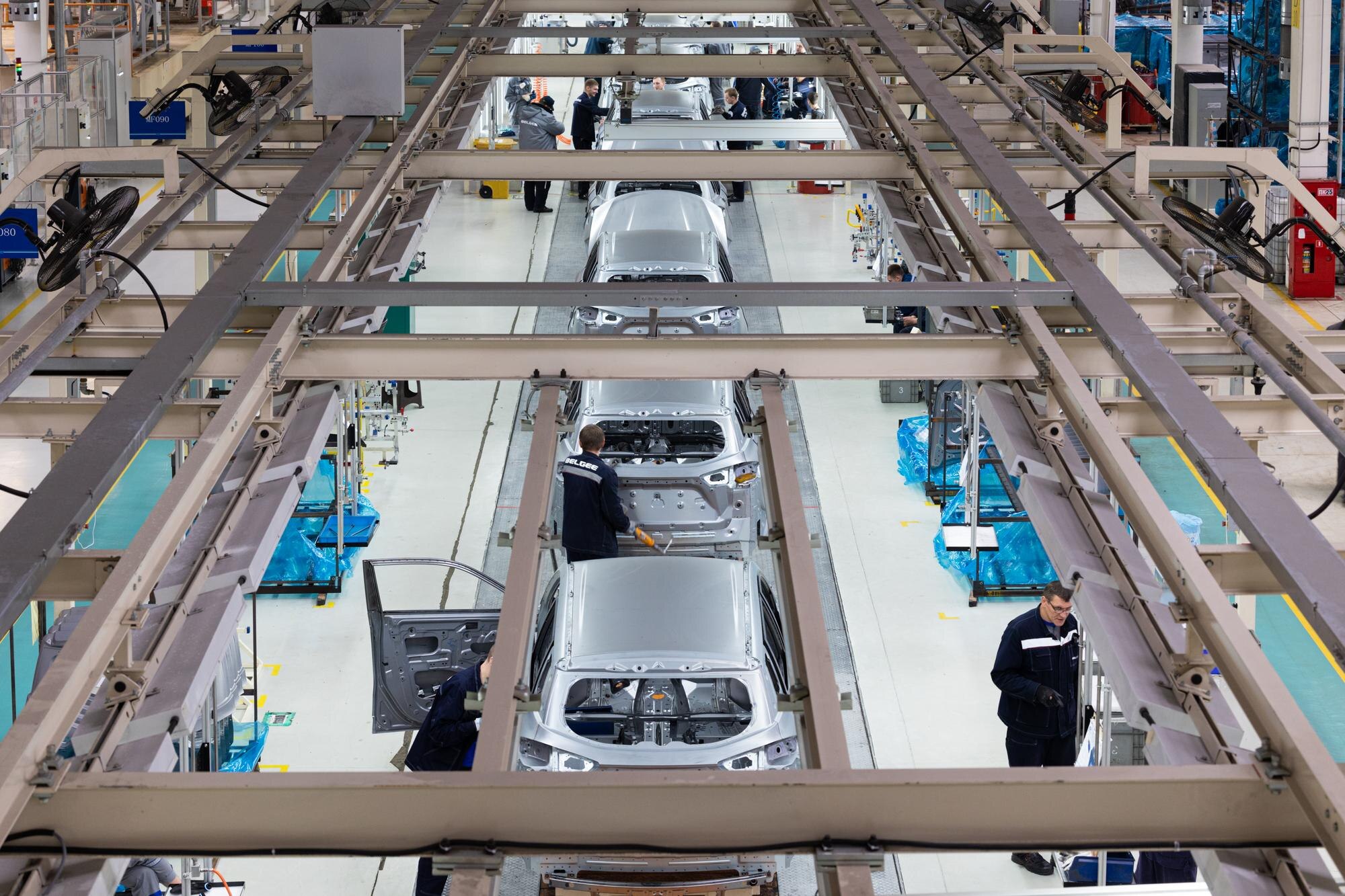Impact of New Tariffs and Initial Industry Shifts
The newly imposed 25% tariffs on foreign autos and parts by the U.S. have caused more than just a ripple in the global automotive industry, with many car manufacturers scrambling to relocate manufacturing to the U.S. to avoid tariffs. For example, Honda is moving Civic hybrid production from Mexico to Indiana, while Volvo is expanding output in South Carolina.
Analysts are predicting some earnings pressure and companies like Toyota, Honda, and certain German car makers are expected to see earnings cuts of up to 30%, while General Motors faces a potential $13 billion tariff cost. Alongside that there is an impact on the consumer. Volkswagen is now listing an “import fee” on its U.S. car prices to show customers how much the tariffs are costing them, potentially adding £2,300 to £9,200 ($2,900 to $12,000) per vehicle.
The U.S. government is arguing that tariffs will bring jobs back to American factories, however, experts are warning that layoffs in the automotive sector could happen before any production shifts take effect. They suggest it could impact 20,000 units of production per day in North America, with Canada and Mexico issuing retaliatory measures.
Manufacturer Responses and Market Reactions
The global auto industry is now in a state of uncertainty, bracing for long-term disruptions with companies adjusting strategies to cope with rising costs and shifting supply chains.
In Europe, auto supply chain industry is absorbing the higher costs and that will potentially lead to factory closures and job losses.
In addition to passing the import fee on to consumers, Volkswagen has halted all US-bound shipments and is holding tens of thousands of vehicles at American ports while it reassesses its strategy. The company is reportedly hoping for either a policy reversal or an opportunity to negotiate lower tariff rates. Despite already investing over $14 billion in US manufacturing, including its Chattanooga, Tennessee plant, Volkswagen remains heavily reliant on imports from Germany and Mexico, making it one of the most affected car makers. The company has warned that these tariffs could have negative consequences for the global automotive industry, supply chains, and consumers. Volkswagen’s move could set a precedent for other car makers, potentially turning showrooms into a tariff blame game as manufacturers struggle to navigate the new trade landscape
Divergent Manufacturer Approaches
Not all manufacturers are adopting this approach. Ford is offering employee pricing discounts to all customers until June 2, 2025, as part of its “From America, For America” campaign. Stellantis (Jeep, Dodge, Chrysler) has paused production at two assembly plants in Canada and Mexico, leading to 900 layoffs. BMW is absorbing the cost of tariffs on its Mexican-made models, meaning its 2 Series and 3 Series vehicles won’t see price hikes. Ferrari has raised prices by 10% on most of its models. Mercedes-Benz is stockpiling inventory in the U.S. ahead of the tariffs to avoid immediate price increases. Nissan has paused new U.S. orders for two Infiniti SUVs built in Mexico. Porsche has revised its earnings forecasts downward due to the tariffs and lower demand in China. Jaguar Land Rover (JLR) is pausing shipments to the U.S. The company has stated that the U.S. remains an important market, but it needs time to develop mid-to-long-term strategies.
JLR and Broader Trade Implications
JLR’s decision comes amid broader concerns about the impact of tariffs on British exports, with the UK government taking a cautious approach rather than rushing to retaliate. The company has emphasized its resilience and ability to adapt to changing market conditions.
This pause could affect billions in exports, as JLR sold £6.5 billion worth of cars to the U.S. last year. The company is expected to resume shipments once it has a clearer strategy in place
Other strategies are also being deployed to mitigate the impact of tariffs and maintain competitiveness. Many companies are relocating manufacturing to tariff-free regions or expanding domestic production to avoid import duties. Businesses are sourcing materials from alternative suppliers in countries with lower tariffs to reduce costs and some are applying for exemptions or tariff relief from governments to minimize financial strain.
Investing in automation and AI-driven analytics is helping manufacturers reduce operational costs and offset tariff expenses and we have seen firms stockpiling raw materials before tariffs take effect to delay cost increases. They are also having to implement lean management practices to cut costs and improve efficiency.
The automotive sectors most impacted by the U.S. tariffs seem to be luxury and premium brands with JLR, Infiniti, and Lexus particularly exposed as 24-41% of their global sales come from U.S. imports. Japanese car makers Toyota, Honda, and Nissan collectively sold 1.53 million imported vehicles in the U.S. last year, making up 9% of their global sales and German car makers Volkswagen, BMW, and Mercedes-Benz face a 7% exposure to the U.S. market, with Volkswagen relying on imports for 80% of its U.S. sales.
Exploring Alternative Markets and Global Trade Shifts
Car manufacturers are also actively exploring alternative markets in an attempt to offset losses. South Korea is ramping up efforts to expand exports to Latin America, Africa, and Southeast Asia, offering tax cuts and subsidies to support domestic manufacturers. European car makers are shifting focus toward China and the Middle East, where demand remains strong despite global trade tensions. Stellantis, which imports 35% of its U.S. sales, is struggling to regain market share and may increase investments in South America and India.
With global trade shifting, car makers must be agile and proactive in their approach to new market penetration. Manufacturers looking to expand into new markets will need a mix of government support, strategic partnerships, and consumer-focused initiatives to succeed.
Countries like the UK are offering tax breaks and subsidies to help manufacturers transition to electric vehicles and expand exports. Companies must build brand awareness, educate consumers on new technologies, and tailor products to local preferences. Collaborating with local suppliers, dealerships, and tech firms can help car makers adapt to regional demands and accelerate market entry. However, navigating trade policies, tariffs, and emissions standards will be crucial for entering unfamiliar markets.
Consumer Reactions and Shifts in Buying Behavior
Consumers are already reacting to the rising costs of vehicles. Many buyers are postponing their car purchases, hoping prices will stabilise, while more consumers are turning to the used car market, though supply is limited. Some buyers are choosing lower-cost vehicles or fewer features to offset the price hikes and leasing is becoming a more attractive way to avoid long-term financial strain. There will always be some consumers who accept the higher prices as the new normal and are resigned to pay the higher price.
With all this turmoil, the Trump administration is considering temporary exemptions for car makers to allow time for supply chain adjustments, which could influence these various market strategies.
LenX Consulting: Strategic Solutions for Global Expansion
LenX Consulting specialises in global market expansion and could be a valuable partner for car makers navigating the new U.S. tariffs. We offer strategic consulting to help businesses unlock opportunities in key markets across Asia, Europe, and the Middle East.
LenX Consulting has a strong presence in South Korea, China, the UK, Switzerland, UAE, Singapore, France, and Italy. For diversified market reach and tailored solutions, consider exploring what LenX Consulting has to offer.
Written by Ken Nathan




